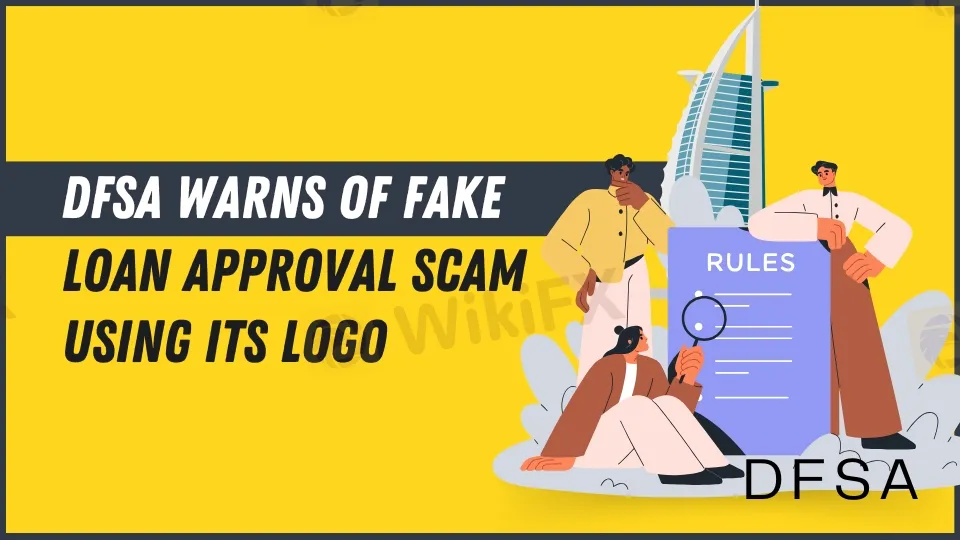简体中文
繁體中文
English
Pусский
日本語
ภาษาไทย
Tiếng Việt
Bahasa Indonesia
Español
हिन्दी
Filippiiniläinen
Français
Deutsch
Português
Türkçe
한국어
العربية
DFSA Warns of Fake Loan Approval Scam Using Its Logo
Abstract:The DFSA warns the public of a fraudulent loan approval letter featuring its logo, aimed at scamming individuals into paying a fake loan fee.

The Dubai Financial Services Authority (DFSA) has issued an urgent warning about a new scam that targets people with false loan acceptance letters. In an effort to seem professional, the letters falsely claim to be from Crowe Finance Ltd and make use of the DFSA emblem.
The forged letter tells recipients that they have been authorized for a loan of AED 25,000 with a payback term of 48 months. It further adds that monthly payments of AED 596 are required and offers a “customer service representative” to answer questions. In an attempt to mislead, the letter provides explicit instructions to ensure that bank accounts are adequately funded to prevent further costs.
The DFSA has verified that this letter is a hoax and was not issued by them or Crowe Finance Ltd, which is not licensed by the DFSA to operate. The DFSA has also said that no company is allowed to use its logo in communications without prior permission.
Consumers should reject such emails and avoid transferring money or personal information to people involved in the scam.
To increase safety, the DFSA has given tools on how to spot typical scams and prevent falling victim to fraudulent schemes. These warnings are published on their website, which also includes all issued notifications. The DFSA also invites customers to check their Public Register to see whether any companies or persons claim to be regulated.
If you have any suspicions regarding the validity of a letter or document purporting to be from the DFSA or a DFSA-regulated business, the DFSA suggests that you contact them immediately via their complaints mechanism or the DIFC Authority.
Finally, as frauds get more complex, it's vital to be watchful. Always double-check messages that seem to be official, particularly those involving money. If something appears too good to be true, it most often is.

Disclaimer:
The views in this article only represent the author's personal views, and do not constitute investment advice on this platform. This platform does not guarantee the accuracy, completeness and timeliness of the information in the article, and will not be liable for any loss caused by the use of or reliance on the information in the article.
Read more

RM62k Lost Investment Scam After Joining XRP Community Malaysia on Telegram
A 30-year-old homestay manager from Chendering, Malaysia, fell victim to an online bitcoin investment scam, losing RM62,214.59. According to Kuala Terengganu police chief ACP Azli Mohd Noor, the incident unfolded after the victim joined a Telegram group named “XRP Community Malaysia” on December 19. The group promoted bitcoin investments allegedly powered by Artificial Intelligence (AI).

Victims of Financial Fraud in France Suffer Annual Losses of at Least €500 Million
Financial fraud in France is becoming increasingly diverse, with reports indicating that victims incur annual losses of at least €500 million.

Robinhood Launches Options Trading in the UK by 2025
Robinhood to introduce options trading in the UK by 2025 following FCA approval. Discover how this expansion aligns with Robinhood's strategy for global growth and new features.

Hong Kong Stablecoins Bill Boosts Crypto Investments
Hong Kong's Stablecoins Bill sets regulatory standards for crypto issuers and platforms, aiming to protect investors and strengthen the city's crypto investment appeal.
WikiFX Broker
Latest News
Two Californians Indicted for $22 Million Crypto and NFT Fraud
Macro Markets: Is It Worth Your Investment?
Trading is an Endless Journey
WikiFX Review: Is Ultima Markets Legit?
Colorado Duo Accused of $8M Investment Fraud Scheme
What Impact Does Japan’s Positive Output Gap Have on the Yen?
RM62k Lost Investment Scam After Joining XRP Community Malaysia on Telegram
Victims of Financial Fraud in France Suffer Annual Losses of at Least €500 Million
Malaysia Pioneers Zakat Payments with Cryptocurrencies
FCA's Warning to Brokers: Don't Ignore!
Currency Calculator


